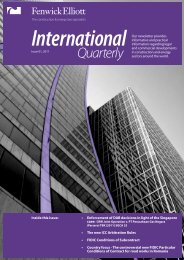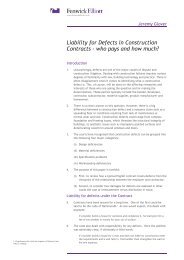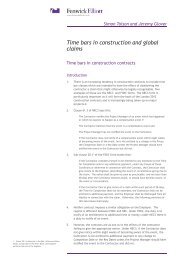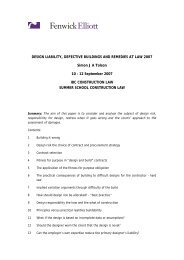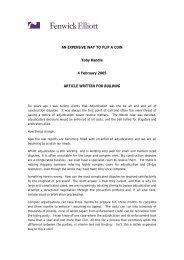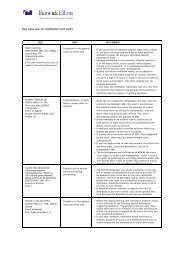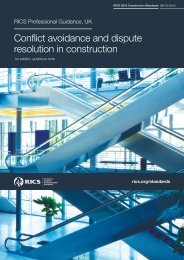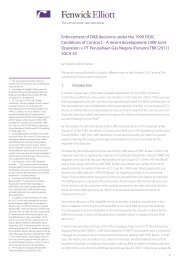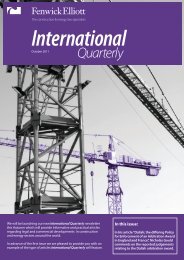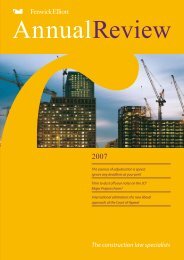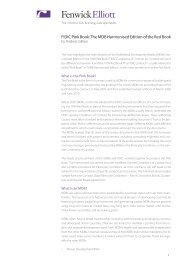Standard forms: JCT 2005, NEC3 and the Virtual ... - Fenwick Elliott
Standard forms: JCT 2005, NEC3 and the Virtual ... - Fenwick Elliott
Standard forms: JCT 2005, NEC3 and the Virtual ... - Fenwick Elliott
You also want an ePaper? Increase the reach of your titles
YUMPU automatically turns print PDFs into web optimized ePapers that Google loves.
<strong>St<strong>and</strong>ard</strong> <strong>forms</strong>: <strong>JCT</strong> <strong>2005</strong>, <strong>NEC3</strong> <strong>and</strong> <strong>the</strong> <strong>Virtual</strong> Contract<br />
www.fenwickelliott.co.uk<br />
There is one o<strong>the</strong>r case (albeit not a construction case but one which features one of <strong>the</strong><br />
prime exponents of partnering) which highlights <strong>the</strong> danger for contractors of partnering.<br />
In <strong>the</strong> case of Baird Textiles Holdings Limited v Marks <strong>and</strong> Spencer Plc, a claim was made by<br />
Baird arising out of <strong>the</strong> termination of its trading relationship. 39 Baird had been one of <strong>the</strong><br />
principle suppliers of clo<strong>the</strong>s to Marks <strong>and</strong> Spencer for 30 years when without warning<br />
Marks <strong>and</strong> Spencer determined all supply arrangements between <strong>the</strong>m with effect from<br />
<strong>the</strong> current production season. Baird claimed that Marks <strong>and</strong> Spencer could not do this<br />
without a reasonable notice of perhaps as long as 3 years.<br />
In a statement given by a former chairman of Marks <strong>and</strong> Spencer, Sir Richard Greenbury<br />
stated that:-<br />
“The special partner relationship which M&S developed with all its suppliers of<br />
goods <strong>and</strong> services was, from its inception some 70 years ago, a cornerstone<br />
principle of <strong>the</strong> company. Fur<strong>the</strong>rmore, it was at <strong>the</strong> very heart of <strong>the</strong> way we<br />
did business with our suppliers M&S was going to carry on doing business with<br />
<strong>the</strong> manufacturer season after season, year after year … Once a major supplier to<br />
M&S, always a supplier - unless <strong>the</strong> manufacturer’s performance was considered<br />
to be poor …”<br />
A Marks <strong>and</strong> Spencer witness said:-<br />
“M&S was developed by principle of partnership. This was not a partnership in<br />
<strong>the</strong> legal sense, but more in <strong>the</strong> sprit of cooperation. The people involved in<br />
managing M&S <strong>and</strong> <strong>the</strong> suppliers had known each o<strong>the</strong>r for a long time, seeing<br />
<strong>the</strong>ir companies grow toge<strong>the</strong>r. As a result, <strong>the</strong>y were able to trust each o<strong>the</strong>r,<br />
converse freely <strong>and</strong> work toge<strong>the</strong>r for mutual benefit … both fed off each o<strong>the</strong>r<br />
… it was in <strong>the</strong> best interest of M&S for its suppliers to grow with it, <strong>the</strong>reby<br />
passing on greater economic scale to M&S <strong>and</strong> hence its customers …”<br />
It was Baird’s case that given <strong>the</strong> length <strong>and</strong> nature of <strong>the</strong> relationship, it was a long<br />
term one which would only be terminable upon <strong>the</strong> giving off reasonable notice. Marks<br />
<strong>and</strong> Spencer were required to deal with Baird in good faith. However, <strong>the</strong> Court held<br />
that <strong>the</strong>re were no contractual obligations between M&S <strong>and</strong> Baird because of a lack of<br />
certainty. There were no objective criteria by which <strong>the</strong> Court could assess what would<br />
be reasonable in relation to quantity or price. The lack of certainty confirmed <strong>the</strong> absence<br />
of any clear evidence of an intention to create legal relations. It could not be said that <strong>the</strong><br />
conduct of <strong>the</strong> parties was consistent with <strong>the</strong> existence of <strong>the</strong> contract that Baird sought<br />
to imply.<br />
Equally, <strong>the</strong> Court of Appeal rejected <strong>the</strong> argument that Marks & Spencer’s conduct in<br />
establishing <strong>and</strong> maintaining <strong>the</strong> long term relationship induced Baird to believe that <strong>the</strong><br />
relationship was long term <strong>and</strong> would only be terminated upon <strong>the</strong> giving of reasonable<br />
notice <strong>and</strong> as such as a consequence of reliance upon this, it would be unjust <strong>and</strong><br />
inequitable to allow Marks <strong>and</strong> Spencer to act inconsistently with this belief. Thus Marks<br />
<strong>and</strong> Spencer would not have been estopped from denying <strong>the</strong> relationship with Baird.<br />
39 Court of Appeal 28 February 2001.<br />
In short, whilst <strong>the</strong> parties had an extremely good long term commercial relationship<br />
(based on partnering principles), it was not one which <strong>the</strong>y ever sought to express or<br />
which <strong>the</strong> Court would ever seek to express in terms of long term contractual obligations.<br />
27



